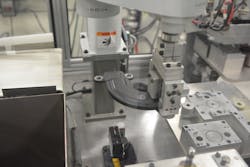Viking Plastics leader pessimistic about UAW strike
By Karen Hanna
From the outside looking in, Viking Plastics President and CEO Kelly Goodsel doesn’t think the gap between what the United Auto Workers (UAW) wants and what the Big Three automakers are willing to deliver is even close.
As the UAW again expanded its strike, which has entered its third week, Goodsel said he’s lost his initial optimism that a labor breakdown between the two sides would be short. Instead, he predicted Friday it could have long-term effects on a supply chain so recently reeling from the COVID pandemic, chip shortages and other disruptions.
“There are going to be suppliers — small, medium, and large suppliers — that if this isn't resolved, in the next, call it four to six weeks, that by the end of the year, they're going to be out of business,” Goodsel said shortly after UAW President Shawn Fain called on 7,000 workers at a Ford assembly plant in Illinois and a General Moters’ (GM) assembly plant in Michigan to join other union members on strike at Ford, GM and Stellantis sites.
The strikes at the plants will have a trickle-down effect on both suppliers and car buyers — because no matter when the strike ends, some suppliers won’t be around any longer to make the parts that allow cars to hit dealership lots.
“They’re not financially stable now, and when the strike starts to impact their revenue streams, they're going to be in trouble,” Goodsel said. “And then, when people want to build new cars, a chassis supplier, an engine supplier, an air conditioning supplier isn’t going to be able to make parts … very similar to the chip issue with COVID, not going to be able to build enough cars.”
Will that be Corry, Pa.-based Viking Plastics’ situation?
“No way,” Goodsel responded. “No way.”
With a portfolio balanced about equally between customers in and outside the auto industry, Goodsel said Viking Plastics is better insulated than many suppliers from the turmoil caused by the strike.
But he’s been preparing his workforce since the summer for trouble ahead.
“We've been telling them since probably July, ‘If you have money in the bank for a rainy day, don't spend it this summer.’ We knew this fall was going to be contentious,” he said. “We've told them that we’re not making any labor adjustments at this point. We've told them that business has not been impacted in a significant way. And, if and when it is, we will communicate that and tell them to the best of our knowledge what we know.”
So far, that’s meant only an end to weekend work — a change likely to continue through December, as the company navigates what’s normally a slower fourth quarter.
But, depending on how long the strike lasts, Goodsel said other changes could come, as well.
Having worked at Viking Plastics for 23 years, he’s watched other labor disputes involving the UAW and the Big Three unfold.
But this time, Goodsel said the two sides seem much farther apart. Sticking points like the UAW’s demand for a 32-hour workweek are “over the top.”
“I think there is a tonal difference. In past strikes, it was really a negotiating process that both parties came in, I think, with a realistic expectation of the process. … This seems a lot more than a dance. … If I was in the union looking at Ford, Stellantis and GM making $20 billion a year, I’d probably say, ‘I want some of that, as well.’ And the flip side is the auto companies looking at a 32-hour workweek [that] would put them out of business. I mean, that's crazy.”
Karen Hanna, senior staff reporter
About the Author
Karen Hanna
Senior Staff Reporter
Senior Staff Reporter Karen Hanna covers injection molding, molds and tooling, processors, workforce and other topics, and writes features including In Other Words and Problem Solved for Plastics Machinery & Manufacturing, Plastics Recycling and The Journal of Blow Molding. She has more than 15 years of experience in daily and magazine journalism.
